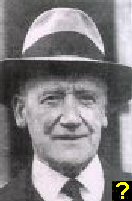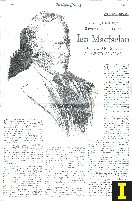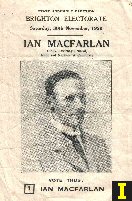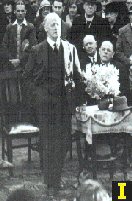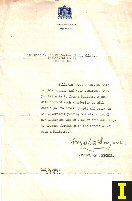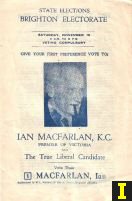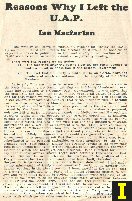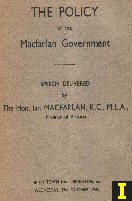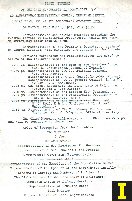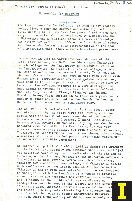Reasons Why I Left the
U.A.P.
Ian Macfarlan
This circular will serve to explain my reasons for leaving the U.A.P. By no other method can I reach the electors, as it would be hopeless to expect the Press to publish it in full, and a. very small fraction of the 29,000 electors could, or would, attend an explanatory meeting.
There were two reasons for my action:-
|
(1)
| |
The fact that, after the recent election, the Party decided to continue to sit in opposition to the present Government.
|
|
(2)
| |
The fact that the Party is controlled by an outside body, the members of which are unknown to the majority of the Party Members.
|
As to (1): This was the main reason. It was the unanimous view in the Party during the last Parliament, that we had badly blundered in ever going into opposition to a Country Party Government. It was urged that the policies of the U.A.P. and of the U.C.P. were in all essentials identical, and for that reason we were in a ridiculous position sitting in opposition. It was generally recognised, however, that without further ridicule nothing could be done to repair the blunder during the life of that Parliament. In the result, of about 200 Bills which were presented by the Government and passed by the Assembly, and apart from certain amendments proposed, only one Bill of major importance, namely the Melbourne and Metropolitan Board of Works Bill was opposed by our so-called opposition. In addition, certain Members of the Party, while professing agreement with the general ideas above stated, and also in the view that the only guarantee of stable government was a working arrangement with the U.C.P., were continually in and out of Parliament preaching "war to the knife" against that Party. It was in these circumstances that the Country and Liberal Section was formed and publicly announced that it would give general support to the Government as its members felt that the interests of the State were being subordinated to the personal antipathies of these members to the Government and particularly against the Premier, owing to the view they took of the events leading up to the formation of the Government, the whole history of which has never yet been disclosed. It is sufficient for me to say that I have always known there were certainly two sides to that matter. But for the sudden election this question of the position of the Party towards the Government would have been finally thrashed out and the position to be taken up in the new Parliament determined. I had made up my mind - and had freely stated so - that I would not in another Parliament continue in the absurd position I found myself in the old one, that is, sitting in opposition to a Party with almost identical politics to our own and by so doing helping to prolong indefinitely what was said, at all events in the Party, to be the existing undesirable arrangement between the U.C.P. and the Labor Party. I felt, and still feel, that the surest way of ending that arrangement, if it was desirable to do so, was for the U.A.P. to declare itself in support of the Government and so bring about the working arrangement referred to. At the first Party meeting after the election this question was raised but the motion to give effect to my views, with which certain other members agreed, was defeated and it was decided to adjourn further consideration of the matter until April, 1938, in the hope that the Country Party Conference then to be held would be controlled by a section hostile to the Government and some vague benefit to the U.A.P. result. I regarded this as merely playing with the question, all the more so as it has been generally conceded that the Government has done good work, and for that reason, in my opinion, our position should not be made to depend on any anticipated hostile and probably futile move against it. On the opening of Parliament I crossed the House and sat as an Independent Member. All that means is that I sit on the same side of the House as the Government - as do all other Independent Members - but with perfect freedom to vote on measures as I feel proper. I have no hesitation in saying that in its present position the U.A.P. is merely playing into the hands of the Labor Party, and that the personal antipathies referred to, against a Government which is admittedly doing good work, are being allowed to outweigh the real interests of the State. As I have already stated, the matters referred to would have been decided prior to the election had the latter been held at the normal time, viz., about March, 1938. Moreover they were of such a nature that they could not be discussed during the election; they were discussed and decided in the manner I have indicated at the proper time, viz., the first Party meeting after the election and before members decided where they would sit in the new Parliament. Any discussion on the important issue raised appeared to be overshadowed by the fact that certain members of the party and of its organisations, ignoring recent political history and the progress of the U.C.P., are obsessed with the idea based on past political history that the U.A.P. as between it and the U.C.P. is entitled to a monopoly of Government or at all events a predominant share in it.
As to (2): It has been claimed that members of the U.A.P., as distinct from those of other Parties, have perfect freedom of political expression and action. My nine years' experience in the Party has convinced me that this statement is a mere sham. While it is quite true that members are not required to give express pledges, the penalty of voting, speaking or acting contrary to the views of the Central Body referred to is that its powerful hostility is earned, especially when the question of endorsement at the next election is being considered and despite the fact that under the rules of the organisation, that body has no right whatever in the case of a sitting Member to consider the question of endorsement at all. During the last Parliament my alleged freedom as a Member of the Party called down the wrath of this body on me in respect of four major matters, namely, my advocacy of support for the Government by the U.A.P., the part I played in the formation of the C. and L. Section with its announcement of general support for the Government, my support in the Higginbotham Province election of the Hon. J. A. Kennedy as against his opponent who was, contrary to the rules of the organisation, secretly supported by the central body, threats being conveyed to me of what would happen to me at my next election, which were disregarded by me, and finally my strong support of the Legislative Council Reform Bill which is anathema to the Central body and the conservative interests behind it. The hostility culminated in the threatened endorsement of a candidate against me at the recent election. It was common knowledge that "they" were determined, if possible to do it successfully, to endorse a candidate against me, and shortly before nomination day "they" demanded through the Leader of the Party that I, as a condition of this not being done, should undertake to make a statement to the Press that the Country and Liberal Section would after the election, cease to exist. I refused and took it that a former opponent whose name was being freely referred to in the Press would be endorsed against me. I had good reason to know that ever since the dissolution exhaustive inquiries were being made throughout Brighton as to the chances of success of the particular opponent suggested and the fact that he was not ultimately endorsed was due, not to any regard to my interests, but to the fear of the result of the election. I had already informed the Leader of the Party that I did not care whether I was endorsed or not, nor do I even know now what happened about endorsement. But I was careful in my election literature not to describe myself as an endorsed U.A.P. candidate. The hostility described above would not in itself have compelled me to leave the Party as it has always existed, and has always been disregarded by me. But coupled with the more important matters referred to in (1) it, no doubt, influenced me in taking the step which I did. Ever since I have been associated with the Party it has been the habit of its Members to attack the caucus system of the Labor Party. The central body referred to is merely introducing in itself that system into the U.A.P. It cannot be wrong in the Labor Party and right in the U.A.P. In the case of the latter it is quickly driving the Party on to the rocks by seizing control to the detriment of and causing the disappearance of the branches of the organisation in the constituencies. My experience has been that the members of the Central body, as bosses of the U.A.P., are little different to the much criticised bosses of the Labor Party. The latter are at least frank and open about it.
In conclusion, I now find myself virtually in the same position as my predecessor, Mr. Snowball, who was in fact opposed by a nominee of a body in the Nationalist Party similar to the one I have referred to in the U.A.P., for no other reason than that he dared to assert in his parliamentary work a degree of independence displeasing to it. The criticism of myself has been made without any knowledge of the foregoing facts and in any event falls to the lot of any public man who dares to depart from the path laid down for him by others, and differs little from the criticism of him. The result of the opposition to him was disastrous to the then Nationalist caucus. While I sit as an Independent, I remain free to support the policy of the U.A.P. in all matters in which I believe it to be right. It is said that an Independent cannot function satisfactorily. If I find that to be so I will not hesitate to reconsider my position and sit wherever I feel I can do the best work, remaining always, first and foremost a Liberal like my predecessors in Brighton, the late Chief Justice Higinbotham, Sir Thomas Bent, and Mr. Snowball.
IAN MACFARLAN.
News Print

